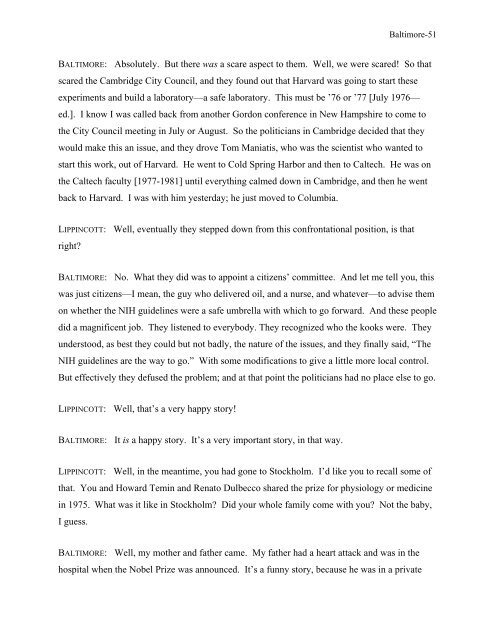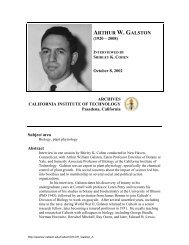Interview with David Baltimore - Caltech Oral Histories
Interview with David Baltimore - Caltech Oral Histories
Interview with David Baltimore - Caltech Oral Histories
You also want an ePaper? Increase the reach of your titles
YUMPU automatically turns print PDFs into web optimized ePapers that Google loves.
<strong>Baltimore</strong>-51<br />
BALTIMORE: Absolutely. But there was a scare aspect to them. Well, we were scared! So that<br />
scared the Cambridge City Council, and they found out that Harvard was going to start these<br />
experiments and build a laboratory—a safe laboratory. This must be ’76 or ’77 [July 1976—<br />
ed.]. I know I was called back from another Gordon conference in New Hampshire to come to<br />
the City Council meeting in July or August. So the politicians in Cambridge decided that they<br />
would make this an issue, and they drove Tom Maniatis, who was the scientist who wanted to<br />
start this work, out of Harvard. He went to Cold Spring Harbor and then to <strong>Caltech</strong>. He was on<br />
the <strong>Caltech</strong> faculty [1977-1981] until everything calmed down in Cambridge, and then he went<br />
back to Harvard. I was <strong>with</strong> him yesterday; he just moved to Columbia.<br />
LIPPINCOTT: Well, eventually they stepped down from this confrontational position, is that<br />
right<br />
BALTIMORE: No. What they did was to appoint a citizens’ committee. And let me tell you, this<br />
was just citizens—I mean, the guy who delivered oil, and a nurse, and whatever—to advise them<br />
on whether the NIH guidelines were a safe umbrella <strong>with</strong> which to go forward. And these people<br />
did a magnificent job. They listened to everybody. They recognized who the kooks were. They<br />
understood, as best they could but not badly, the nature of the issues, and they finally said, “The<br />
NIH guidelines are the way to go.” With some modifications to give a little more local control.<br />
But effectively they defused the problem; and at that point the politicians had no place else to go.<br />
LIPPINCOTT: Well, that’s a very happy story!<br />
BALTIMORE: It is a happy story. It’s a very important story, in that way.<br />
LIPPINCOTT: Well, in the meantime, you had gone to Stockholm. I’d like you to recall some of<br />
that. You and Howard Temin and Renato Dulbecco shared the prize for physiology or medicine<br />
in 1975. What was it like in Stockholm Did your whole family come <strong>with</strong> you Not the baby,<br />
I guess.<br />
BALTIMORE: Well, my mother and father came. My father had a heart attack and was in the<br />
hospital when the Nobel Prize was announced. It’s a funny story, because he was in a private

















